
Giant Steps is a studio album by the jazz musician John Coltrane. It was released in February 1960 through Atlantic Records. This was Coltrane's first album as leader for the label, with which he had signed a new contract the previous year. The record is regarded as one of the most influential jazz albums of all time. Many of its tracks have become practice templates for jazz saxophonists. In 2004, it was one of fifty recordings chosen that year by the Library of Congress to be added to the National Recording Registry. It attained gold record status in 2018, having sold 500,000 copies.
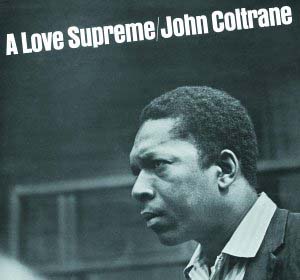
A Love Supreme is an album by the jazz saxophonist and composer John Coltrane. He recorded it in one session on December 9, 1964, at Van Gelder Studio in Englewood Cliffs, New Jersey, leading a quartet featuring pianist McCoy Tyner, bassist Jimmy Garrison and drummer Elvin Jones.
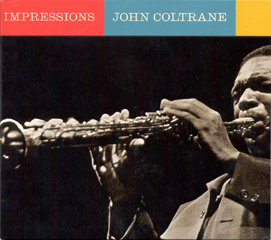
Impressions is an album of live and studio recordings by the jazz musician and composer John Coltrane. It was released through Impulse! Records in July 1963.

Monk's Music is a jazz album by the Thelonious Monk Septet, which for this recording included Coleman Hawkins and John Coltrane. It was recorded in New York City on June 26, 1957, and released in November the same year.

Olé Coltrane is a studio album by the jazz musician and composer John Coltrane. It was released in November 1961 through Atlantic Records. The album was recorded at A&R Studios in New York, and was the last of Coltrane's Atlantic albums to be made under his own supervision.

Coltrane Plays the Blues is an album of music by the jazz musician John Coltrane. It was released in July 1962 by Atlantic Records. It was recorded at Atlantic Studios during the sessions for My Favorite Things, assembled after Coltrane had stopped recording for the label and was under contract to Impulse Records. Like Prestige Records before them, as Coltrane's fame grew during the 1960s, Atlantic used unissued recordings and released them without either Coltrane's input or approval.

Interstellar Space is a studio album by American jazz saxophonist John Coltrane, featuring drummer Rashied Ali. It was recorded in 1967, the year of his death, and released by Impulse! Records in September 1974.

Thelonious Monk with John Coltrane is a 1961 album by Thelonious Monk issued on Jazzland Records, a subsidiary of Riverside Records. It consists of material recorded four years earlier when Monk worked extensively with John Coltrane, issued after Coltrane had become a leader and jazz star in his own right.

Live in Japan is a live album by American saxophonist John Coltrane, recorded for radio broadcast during his only Japanese tour in July 1966 at two Tokyo venues, Shinjuku Kosei Nenkin Hall and Sankei Hall. The recordings feature his last group, a quintet featuring Coltrane, his wife/pianist Alice, saxophonist/bass clarinetist Pharoah Sanders, bassist Jimmy Garrison and drummer Rashied Ali.

Coltrane's Sound is an album credited to the jazz musician John Coltrane, recorded in 1960 and released in 1964 on Atlantic Records, catalogue SD 1419. It was recorded at Atlantic Studios during the sessions for My Favorite Things, assembled after Coltrane had stopped recording for the label and was under contract to Impulse! Records. Like Prestige and Blue Note Records before them, as Coltrane's fame grew during the 1960s Atlantic used unissued recordings and released them without either Coltrane's input or approval.

Africa/Brass is a studio album by the jazz saxophonist and composer John Coltrane. It was released on September 1, 1961 through Impulse! Records. Coltrane's working quartet is augmented by a larger ensemble that brings the total to twenty-one musicians. Its big band sound, with the unusual instrumentation of French horns and euphonium, presented music very different from anything that had been associated with Coltrane to date. While critics originally gave it poor ratings, more recent jazz commentators have described it as "amazing" and as a "key work in understanding the path that John Coltrane's music took in its final phases." It is Coltrane's first release for Impulse!.
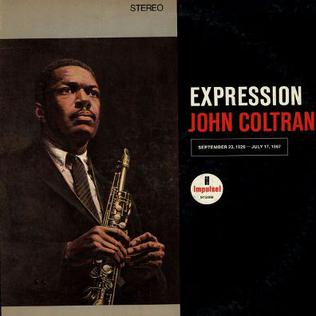
Expression is an album by the jazz saxophonist John Coltrane, recorded in early 1967 and released in late September of that year, around Coltrane's birthday, and two months after his death. This was the first posthumous release of a Coltrane recording, and the last album he personally authorized.
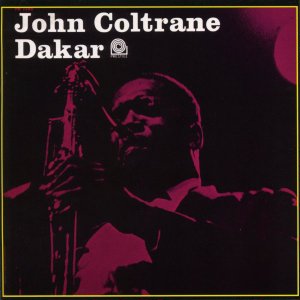
Dakar is a jazz album by saxophonist John Coltrane. It was released in 1963 on Prestige Records.

Coltrane is a studio album by the jazz saxophonist, bandleader, and composer John Coltrane. It was recorded in April and June 1962, and released in July of that year through Impulse! Records. At the time, it was overlooked by the music press, but has since come to be regarded as a significant recording in Coltrane's discography. When reissued on CD, it featured a Coltrane composition dedicated to his musical influence "Big Nick" Nicholas that the saxophonist recorded for his Duke Ellington collaboration Duke Ellington & John Coltrane (1963). The composition "Tunji" was written by Coltrane in dedication to the Nigerian drummer Babatunde Olatunji.

Cattin' with Coltrane and Quinichette is a studio album by jazz musicians John Coltrane and Paul Quinichette released in October 1959 on Prestige Records. It was recorded at the studio of Rudy Van Gelder in Hackensack, New Jersey, and issued two years after the recording sessions took place, and after Coltrane's Prestige contract had ended.

Wheelin' & Dealin' is an album by Frank Wess, John Coltrane, Paul Quinichette, Mal Waldron, Doug Watkins and Art Taylor released in April 1958 by Prestige Records. It was later reissued on New Jazz Records in 1964. On a small number of reissues, it is credited to "The Prestige All Stars", a name used by Prestige for various combinations of musicians who were under contract to the label. The compact disc reissue adds two alternate takes that did not appear on the initial vinyl releases.

Kulu Sé Mama is an album by the jazz musician John Coltrane. Recorded during 1965, it was released in January 1967 as Impulse! A-9106, and was the last album released during Coltrane's lifetime.

Cosmic Music is a jazz album by John Coltrane and Alice Coltrane released after John Coltrane's death. John Coltrane only plays on two tracks, "Manifestation" and "Reverend King".
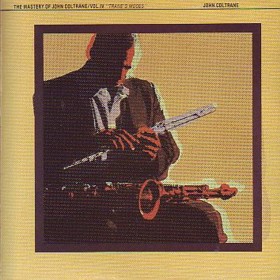
The Mastery of John Coltrane, Vol. IV: Trane's Modes is a compilation album by American saxophonist John Coltrane, released as a double LP in 1979. It features pieces recorded in 1961, two in studio and the remainder live. All the tracks were previously unissued, at the time of release. At present, "Africa " and "The Damned Don't Cry" may be found on the two-disc reissue of Africa/Brass, while all the live pieces have been included on The Complete 1961 Village Vanguard Recordings.

The Mastery of John Coltrane, Vol. I: Feelin' Good is a compilation album by American saxophonist John Coltrane, the first of a series of four compilations released on Impulse! between 1978 and 1979, all sharing the same cover artwork designed by Stuart Kusher, Richard Germinaro and Vigon Nahas Vigon. It features pieces recorded in 1965, seven in studio and one live. All the tracks were previously unissued in these mixes at the time of release. At present, the availability of said tracks is as follows:



















